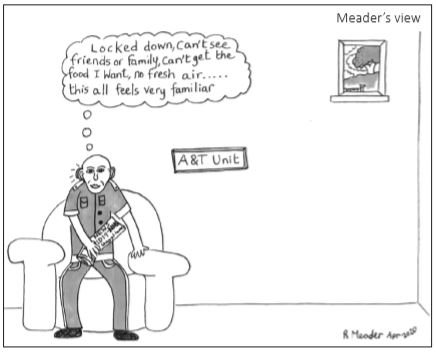Write to Community Living at simonjarrett1@outlook.com. Note: all letters may be edited
Supported living: the next Covid-19 scandal after care homes?
 I am the chief executive of a London-based charity that provides support services to people with learning disabilities in Westminster and neighbouring boroughs. I have raised serious concerns about the lack of Covid-19 testing for people with learning disabilities and the staff who support them. I believe that this is discriminatory and resulting in preventable deaths.
I am the chief executive of a London-based charity that provides support services to people with learning disabilities in Westminster and neighbouring boroughs. I have raised serious concerns about the lack of Covid-19 testing for people with learning disabilities and the staff who support them. I believe that this is discriminatory and resulting in preventable deaths.
More than 2,400 excess deaths of people with learning disabilities and autism were reported between April and May. I believe this is partly due to a lack of testing in learning disability services. It has been our experience that when trying to access testing, we consistently face bureaucracy and a lack of understanding. People with learning disabilities are not viewed as having the same level of vulnerability as older people. As a result, a whole cohort of the community is being discriminated against.
This is of huge concern given the well known health inequalities in the learning disability and autism population, with higher rates of diabetes, obesity, heart disease and other conditions. There are some extremely clinically vulnerable people with profound and multiple learning disabilities. Then there are others who find distancing and hand hygiene rules hard to follow.
Despite all this, we have been repeatedly informed that our service users do not meet the criteria for testing. This may be in part because of confusion and ignorance over their accommodation. People living in small, shared supported living services or their own flats do not qualify for testing in the same way as those in registered care homes. People living in supported housing are therefore being denied accessed to testing. This is grossly unfair, discriminatory and exceptionally dangerous. For all these reasons, supported living and domiciliary care for people with learning disabilities will be the next scandal after care homes.
We have also been asked by the NHS and others to admit people who have not been tested. Despite our considerable efforts to protect vulnerable tenants and prevent any outbreak arising from the admission of untested people, we have been largely unsuccessful in obtaining tests. Testing is needed in all care settings, including supported living, as a prophylactic measure.
We have continually met barriers, bureaucracy and bewilderment. It is frankly neglectful that, without urgent action, we will be lamenting the deaths of more people with learning disabilities and of those who support them.
Gabby Machell
Chief executive, Westminster Society for People with Learning Disabilities, London
● Care in the crisis, page 10
Jean Vanier: a great betrayal
I first heard of Jean Vanier when I was a teenager and he inspired me to join a L’Arche community for a while. After university, I returned to the neighbourhood and remained a close friend.
Over time, my admiration for Vanier was tempered by a growing awareness of his fallibilities. Despite encouraging others to live with adults with learning disabilities, he lived alone. He was homophobic. And his view that all L’Arche members should channel their sexuality into celebration because people with learning disabilities could not have sexual relationships was downright weird.
Nonetheless, I believed Vanier to be a good and humble man, and continued to value L’Arche. I was pleased to see his work being recognised in the UK in recent years, and mourned his death last year. When the news story broke that Vanier, alongside his co-founder Père Thomas, had been engaged in abusive relationships
with female assistants, I was sadly not that surprised. After #metoo and other scandals involving charismatic leaders, the story was all too familiar.
I was also angry that the man who had lied to the Père Thomas inquiry and spoken so beautifully about the dignity and respect of human beings was all the time an abuser himself. And I was devastated for my friends in L’Arche for whom this was such a great betrayal.
Which is why L’Arche’s response has been extraordinary. Most organisations cover up wrongdoings by their founders. L’Arche chose instead to undertake the painful task of open and honest investigation that respected and elevated the victims.
After that, communities were provided with a helpful framework to share the news and support each other (movingly described by Dr Irene Tuffrey-Wijne in her blog: http://www.tuffrey-wijne. com/?p=767). It is an exemplar of good practice, and worth learning from.
Was Vanier a good man who did bad things, or a bad one who did good things? I’m not sure.
What I am sure of is that L’Arche has shown in its worst moment that it is far, far greater than the founders who disgraced it. And I take comfort from that.
Virginia Moffatt
Oxford
● Accusing saints: when no one listens, page 22
